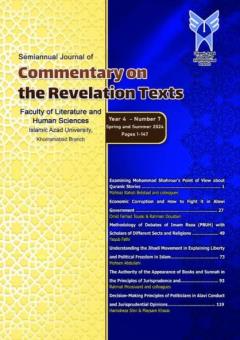Decision-Making Principles of Politicians in Alavi Conduct and Jurisprudential Opinions
Subject Areas : Thematic interpretation of Nahj al-BalaghaHamid Reza Shiri 1 * , Meysam Khazaee 2
1 - Bachelor student of Fiqh and Fundamentals of Islamic Law, Ayatollah Borujerdi University, Borujerd, Iran
2 - Associate Professor, Department of Law, Borujerd Branch, Ayatollah Borujerdi University, Borujerd, Iran
Keywords: Islamic Government, Alavi Conduct, Jurisprudence, Politics, Decision-making,
Abstract :
The requirement to form an Islamic government is the ruling of Sharia in the field of governance, and principles, and some standards have been stated in the text of Sharia for the decision-making of politicians, the observance of which is considered as one of the indicators of the ruling of Sharia or the practical realization of Islamic government. Therefore, it is necessary to prove the existence of these principles and extract them in order to regulate the manner and decision-making of politicians in the Islamic government in order to form a desirable Islamic government and facilitate political decisions and increase their compliance with what is intended by Islamic law. The method of conducting this research is descriptive-analytical, which examines the reign of Imam Ali (A.S.) and the jurisprudential achievements of the mujtahids in the study. Those who are mujtahids in the science of jurisprudence have the ability to express the principles governing the decision-making of political officials in the Islamic government. Therefore, observing the principle of justice and fairness, patience, determination and courage, trust and confidentiality are necessary in the position of decision-making and implementation in jurisprudence and in Islamic government.
قرآن کریم (1397)؛ ترجمه حسین انصاریان، مشهد: به نشر (آستان قدس رضوی).
نهج البلاغه (1379)؛ ترجمه محمد دشتی، قم: انتشارات سید جمال الدین اسد آبادی.
الهامينيا، علي اصغر (بی تا)؛ اخلاق سياسي، قم: زمزم هدايت.
اخوان كاظمي، بهرام (1379). آرمانهاي حكومت از ديدگاه امام علي(ع)، فصلنامه حكومت اسلامي، شماره 17، ص 146-129.
اعرافي، عليرضا (1380)؛ نگرش به حكومت و مديريت از منظر امام علي(ع)، مجله حوزه و دانشگاه، شماره 26.
جعفري تبار، حسن (1381)؛ مباني فلسفه تفسير حقوقي، تهران: شركت سهامي انتشار.
جوادي آملي، عبدالله (1371)؛ فلسفه و اهداف حكومت اسلامي، مديريت دولتي، پاييز، ص 15-1.
حسني، حسن (1385)؛ مفهوم اصول دادرسي و نقش تفسيري آنها و چگونگي تميز اين اصول از تشريفات دادرسي، كانون وكلا، 131-99.
حسينى طهرانى. سيد محمد حسين (1421 ه. ق)؛ ولايت فقيه در حكومت اسلام، جلد 4، مشهد: انتشارات علامه طباطبايى.
خامنهاي، سيد علي (1372)؛ بازگشت به نهج البلاغه، تهران: چاپ رستمخاني.
خميني، سيد روح اللّه (1421 ه. ق)؛ استفتاءات (امام خمينى)، 3جلد، قم: دفتر انتشارات اسلامى.
خراساني، رضا (1383)؛ اخلاق و سياست (اخلاق در انديشه سياسي اسلام)، قم: بوستان كتاب.
دلشاد تهراني، مصطفي (1390)؛ نسبت عدالت و اخلاق در نهج البلاغه، دوفصلنامه پژوهشي انديشه حديث.
شکری، مصطفی؛ طهماسبی فر، فاطمه؛ رحمانی، فاطمه (1402)؛ بررسی نظریه حکمرانی خوب و مقایسه آن با حکمرانی شایسته از منظر امام علی(ع)، دو فصلنامه تفسیر متون وحیانی، سال 4، شماره 6، ص 159-141.
علي بابايي، غلامرضا (1384)؛ فرهنگ سياسي آرش، تهران: نشر آشيان.
فاضل لنكراني، محمد (1388)؛ آيين كشور داري، قم: انتشارات مركز فقهي ائمه اطهار.
قرباني، زين العابدين (1388)؛ منشور مملكت داري در نامه امام علي (ع)، رشت: انتشارات سالار.
قادري، سيدعلي (1390)؛ گفتماني در باب سياست و حكومت، تهران: نشر معارف.
كعبي، عباس (1390)؛ بايسته هاي حكمراني، تهران: موسسه عالي آموزش و پژوهش مديريت و برنامه ريزي.
مطهري، مرتضي (بی تا)؛ مجموعه آثار استاد مطهري، تهران: انتشارات صدرا.
منتظرى، حسين على (1409 ه. ق)؛ مبانى فقهى حكومت اسلامى، ترجمه محمود صلواتى و ابوالفضل شكورى، 8 جلد، تهران: مؤسسه كيهان.
نيازي، احمد علي (1389). اهداف و وظايف حكومت ديني، معرفت سياسي، ص 179-149.
هاشمى شاهرودي، سيد محمود (1426 ه. ق)؛ فرهنگ فقه مطابق مذهب اهل بيت عليهمالسلام، جلد 3، قم: مؤسسه دائرة المعارف فقه اسلامى بر مذهب اهل بيت عليهمالسلام.
ولايى، عيسى (1387)؛ فرهنگ تشريحى اصطلاحات اصول، تهران: نشر ني.
ورعي سيد جواد (1383). نظارت و پرسشگري، فصلنامه حكومت اسلامي، شماره 3، ص 11-5.

